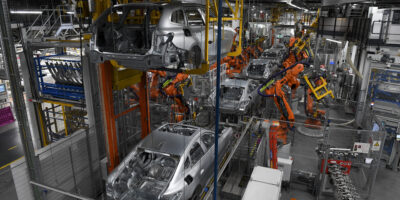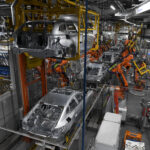
(Source – Shutterstock)
Can smart manufacturing be the answer for APAC organizations’ future business success?
Significant technology developments and growing digitization have fueled the development and expansion of smart manufacturing. Regions all over the world have adopted it as a result of this growth for future success.
In fact, Plex Systems, a Rockwell Automation company released a report titled “The State of Smart Manufacturing Report” that claims that adoption of smart manufacturing accelerated by 50% globally in 2021 and that these new technologies are now solving the industry’s most critical challenges.
Specifically, 93% of organizations in the Asia-Pacific (APAC) region place a higher priority on smart manufacturing than those in North America (84%) or Europe, the Middle East, and Africa (EMEA) (75%).
In contrast to the majority response from North America and EMEA, which was “within the next 1-2 years,” most APAC firms cited a shorter timeframe – “within the next 7 to 11 months” – for adopting smart manufacturing solutions.
The global study surveyed more than 300 manufacturers across a range of sectors, including automotive, aerospace, food and beverage, electronics, consumer products, plastics and rubber, precision metal forming, and more. The report for this year, conducted in association with Hanover Research, provides insightful information on trends, challenges, and future plans for international manufacturers.
According to Jerry Foster, Chief Technology Officer of Plex Systems, the report intends to assist manufacturers in benchmarking their technology strategy and incorporating best practices for smart manufacturing to maintain and grow their market share.
“A scalable technology strategy makes it possible to incrementally adopt solutions and achieve value quickly. As manufacturers look to streamline processes and solve today’s challenges, they are placing significant value on using smart technology to address and improve actual business outcomes,” he commented.
Challenges faced by APAC organizations signify need for smart manufacturing
Being a part of the manufacturing industry is exhilarating. But just like any other industry, manufacturing has its share of challenges.
According to the report’s findings, the pandemic exposed and made pre-existing manufacturing issues worse. As such, the pandemic’s top three challenges for Asia-Pacific businesses include shortages of skilled workers, competition, and supply chain disruptions. Given this, 9 in 10 respondents from APAC (93%) believe that smart manufacturing is essential to the future success of their company.
Steven Chiu, Asia-Pacific sales leader, Plex Systems stated, “Asia’s manufacturing sector has been adversely impacted by the pandemic and global crises such as the civil unrest in eastern Europe. As a key global hub for manufacturing which accounts for nearly half of the worldwide manufacturing output, Asia-Pacific economies are depending on their industrial sectors to drive recovery post-pandemic.”
Realizing this, enterprises have accelerated the deployment of smart manufacturing solutions as a result of the pandemic. Organizations in APAC are intended to invest their money mostly in supply chain planning, automated process enforcement, and business process automation.
“The adoption of smart manufacturing solutions, such as cloud-based technologies, has become imperative for APAC organizations to stay competitive and thrive. The report findings show that organizations in the region are placing significant value on using such technologies to address and improve actual business outcomes,” Chiu added.
Over 50% of APAC organizations are using the cloud to mitigate risks, according to the survey. The most popular risk mitigation techniques used by APAC firms include implementing cloud technology, managing cybersecurity risks, and working with experts on regulatory and compliance matters.
Organizations aren’t just looking to leverage cloud-based technology to improve their business operations. Machine learning and artificial intelligence (AI) are the main technologies that firms want to embrace in the next five years. Organizations utilize acquired data largely for planning reasons, such as product planning/scheduling (46%) and process optimization (44%), while organizations in the Asia-Pacific region (54%) use obtained data mostly for AI applications.
In the end, these challenges the manufacturing industry encounters are opportunities for the sector to grow. Ultimately, the organizations that are willing to face these challenges head-on will not only survive but also grow.
READ MORE
- Strategies for Democratizing GenAI
- The criticality of endpoint management in cybersecurity and operations
- Ethical AI: The renewed importance of safeguarding data and customer privacy in Generative AI applications
- How Japan balances AI-driven opportunities with cybersecurity needs
- Deploying SASE: Benchmarking your approach


